An Italian Wife Read online
Page 17
“Yes,” he said, wondering what pie and football had to do with anything.
He wanted his mother to praise him, like she praised Davy. So he wrote about living in Connecticut and the Fourth of July party and all the things she told him made them American. For his last line, Roger wrote: I am American through and through and proud. His mother smiled when she read it and told him it was the best paper he’d ever handed in. But the day they read their papers out loud, it was Gilda DiCaprio who had the best paper, and Gilda wrote about her Italian grandmother and helping her make meatballs. Gilda’s last line was: Even though I live in America, I will always be Italian in my heart. The teacher actually got teary-eyed when Gilda read that, and the whole class applauded. Except Roger. He stared at his own stupid paper and tried very hard not to rip it up.
THE DAY THE TWO SOLDIERS in their neat, crisp uniforms ring the doorbell with the news, Roger is home from school sick with tonsillitis. Golf balls, Dr. DiMarco said when he came to the house the night before, swinging his black bag. Tonsils as big as golf balls. Roger’s mother made the doctor coffee and waited outside the bedroom door holding a cup of it for him while he examined Roger’s throat. She put on perfume, too, which made Roger’s throat hurt even more.
After Dr. DiMarco gave him a shot of penicillin, he patted Roger’s head and told him to sleep. Then he went and sat with his mother in the kitchen, the sound of their voices rising and falling lulling Roger to sleep. In the morning, he tried to get his mother to play Crazy Eights with him, but she said she wasn’t in the mood.
That is why Roger is on the couch under one of the afghans Mama Jo crocheted watching Jeopardy! when the doorbell rings. Art Fleming is one of his heroes. Roger believes Art Fleming knows all of the answers that the contestants say in the form of a question. He believes that Art Fleming is maybe the smartest man in the world.
The category is “Fairy-tale Heroes.”
“In this fairy tale,” Art Fleming says, “she restores Ariel’s voice.”
“Roger,” his mother calls from somewhere in the house. “Are you too sick to get the door?”
Roger wants Paul Marx from Phoenix, Arizona, to win, mostly because he has two x’s in his biographical information but also because he is an amateur ventriloquist. During the interview portion of the program, Art Fleming asked Paul Marx to talk without moving his lips, and Paul Marx said: What is the art of ventriloquism, Art? His lips really didn’t move, unlike Davy’s.
Paul Marx doesn’t buzz in fast enough and the three-day winner answers correctly.
The doorbell rings again.
“Roger?” his mother says. “Tell whoever it is that I’m busy.”
She is vacuuming. She vacuums all the time, rolling the baby-blue Electrolux around the house with a vengeance.
“I’ll take ‘Fairytale Heroes’ for three hundred,” the three-day winner is saying.
Roger sighs and gets up from the couch. He has on his old fuzzy footy pajamas, red ones with cowboys and Indians on them. They don’t really fit anymore; there is a hole in the feet part and his big toes poke out. He will always remember that he was wearing those pajamas that day, and that as soon as the men left he went into Davy’s bedroom, took them off, and cut them into pieces with the scissors in the desk drawer.
Just as he opens the door, he hears the vacuum turning on.
Surprised to see Army men there, he thinks maybe the Russians have attacked Connecticut and the Army is here to evacuate them.
“Should I pack my stuff?” Roger asks them. He tries to think what he should take and what he should leave behind. Mike Nesmith he will take. Underwear. Socks. His toothbrush.
“Is your mother or father at home?” one of them says, looking straight ahead at a spot somewhere above Roger’s head.
Both men are tall and lean and clean-shaven. Their hats sit low on their foreheads and their jackets have all sorts of medals and stripes and patches, not unlike Davy’s Boy Scout uniform.
“Um,” Roger says, “my mother’s busy.” His father is never home anymore. He is on the road, selling copy machines.
“Please get your mother, son,” the same man says.
Roger hesitates. She is going to be mad at him for sure. When she says she doesn’t feel like talking or seeing people, she means it. Ever since Davy left for Vietnam, his mother avoided everybody. Iris from next door, who always brought tomatoes or zinnias or whatever was in her garden—Just tell her to leave it on the table, she’d instruct Roger; the milkman, who showed up whistling every Saturday morning with two bottles of regular milk, one bottle of chocolate milk, and a small bottle of cream—Just give him the order for next week, Roger; the paperboy, Bobby Anderson, who came around suppertime on Tuesday nights to collect payment—Roger, get the money out of my purse and make sure to give him an extra dollar. She didn’t want to be bothered and Roger’s job was to make sure she wasn’t.
“I can’t,” he tells the Army men. “She’s super-busy.”
The same one kneels down so that he is eye to eye with Roger. “The United States of America requires your mother to come here, son.” His breath smells like the Black Jack gum that Mama Jo chews.
Roger swallows hard. “Like the president?”
“Right,” the man says.
Slowly, Roger follows the sound of the vacuum. At school they did a drill. Let’s say the Russians have dropped the atom bomb, his teacher Miss Sullivan would say. What are you going to do? Duck and cover! the class shouted, and they all hid under their desks. Is that why the Army men are here?
“Mom?” he says.
She is pushing the vacuum across the mauve wall-to-wall carpeting on her bedroom floor.
She doesn’t turn around. She doesn’t turn off the vacuum.
“I think the Russians,” Roger says, and then he begins to cry. “I think they dropped the atom bomb in Connecticut.”
“Uh-huh,” she says.
He watches how hard she pushes the hose, like she is at battle with dust bunnies.
“I think we have to evacuate.” Crying makes his throat hurt more, but he can’t help it.
“And why do you think this?”
Her back is bent over the Electrolux. She has on orange pants and a flowered top that doesn’t quite match. It must be laundry day.
“Because the Army is here and President Johnson said so.”
Without turning off the vacuum, his mother slowly swivels around to face him. There is a look on her face that he’s never seen on anyone before.
“Tell them I’m busy,” she says.
Roger shakes his head. “They said—”
His mother opens her mouth and screams, “Tell them I’m busy!”
The way she sounds scares him and he runs out of the room, all the way back to the door where the two men still wait, standing at attention, staring at something Roger can not see. From behind him, he hears his mother wailing. For an instant, one of the Army men’s jaw tightens and he swallows in a way that makes his Adam’s apple bob up and down, like someone trying not to cry.
EVERY SUMMER MAMA JO goes to Vermont to visit Auntie Chiara, the nun. Her nun name is Sister Sebastian. Roger believes that she doesn’t have any hair—just a high, smooth forehead that ends in her stiff, white wimple. The wimple is topped by a long black veil that makes a sound like someone saying shush when she moves. This summer, Mama Jo is taking Roger to Vermont with her so that his mother can recover. She is mourning Davy and as far as Roger can tell, mourning is a full-time job. Ever since the Army men came to tell them that Davy was MIA and presumed dead, Roger has not been able to look his mother in the eye. He had wished his brother dead, and now he was.
His father packs the medium-sized piece of American Tourister luggage for him, keeping up a cheerful banter the whole while.
“Covered bridges, Roger,” his father says. “And little candy shaped like maple leaves. And good cheese. Boy, are you in for a treat.”
When his father sold Royal typewriters, Vermont wa
s part of his territory. He knows these things.
“What are the bridges covered with?” Roger asks him.
His father frowns. “Wood,” he says.
“Oh,” Roger says, disappointed.
“THAT THING NOT COMING,” Mama Jo says, pointing to Mike Nesmith. Then she says something in Italian.
“She thinks he’s sacrilegious,” Mama G says.
Mama G is driving them to Vermont. They will sleep in motels with beds that shake if you put a coin in them. There will be swimming pools too, and real maple syrup for their pancakes. Aunt Jemima, Roger’s father told him, she’s nothing but a fake.
Everyone stands around Mama G’s dark-green Valiant, waiting for Roger’s mother to come out and say good-bye. But Roger knows she won’t. She isn’t speaking to Mama Jo. Right after the Army men came, Mama Jo arrived. I know what it’s like to lose a child, figlia mia, she’d said, wrapping her arms around his mother. But his mother pulled away. How dare you? she’d said. You have no idea. None. Then his mother slapped Mama Jo across the face and went back into her bedroom. All the aunts screamed and yelled, but Mama Jo just said, Let her go. I understand. For days afterward his mother would blurt, How could she say such a thing?
When it becomes clear that Roger’s mother isn’t coming out, Roger and Mama Jo climb into the backseat and Mama G takes her place behind the wheel and they back out of the driveway. The car smells like Christmas trees from the tree-shaped air freshener that hangs off the rearview mirror. The front seats have strange beaded covers over them, adding to Roger’s feeling that he has entered an exotic magical world. He doesn’t even wave good-bye or look at his father standing there. He is so filled with relief that he is leaving that all he can do is pinch the skin on Mama Jo’s hand and watch it stay there a moment before settling back down.
EVEN THOUGH MAMA JO can’t speak very good English, somehow Roger understands her. He knows when she is tired or hungry or when something strikes her as funny. It has always been this way. Most of the family ignores her, or treats her like she is a nuisance, when all she does really is cook for them and crochet afghans that everyone thinks are hideous. Except Roger. He loves them, loves the clashing colors and wavy pattern. Mama Jo gives him coffee with lots of milk and sugar in a chipped bowl. He’s too young for coffee! his mother scolds her, but Mama Jo pretends she doesn’t hear her.
Sometimes Roger wishes he could crawl inside Mama Jo’s head and see the world through her eyes. Once he told his mother this and she looked at him horrified. His mother doesn’t like most of the things Mama Jo cooks, like veal and peas or polenta with kale. But Roger does. On the rare visits they make from Connecticut to Rhode Island, to see Mama Jo and the rest of the family, he eats so much that he has to take an Alka-Seltzer before bed. Too much oil, his mother says, grimacing in disgust. Mama Jo gives him a tiny glass of apricot brandy for his stomachache. During the night, she comes in to check him. He can smell Black Jack gum and Milk of Magnesia on her breath as she leans over to touch his forehead. Her hands are not soft like his mother’s, They’re calloused and rough and smell like garlic. Mama Jo whispers something in Italian, and even though Roger doesn’t know what it means, he understands that she is telling him she loves him.
On the ride to Vermont, Mama Jo keeps surprising him with treats that she pulls from her big black bag.
“Mama Jo,” Roger says in the car as he leans his head against her arm, “will you teach me how to cook someday?”
Mama Jo pats his head.
“Do you think Davy’s dead?” Roger asks her.
“Morto,” Mama Jo says.
MIA is better, Roger knows that. MIA means living with buffoonish officers like on Hogan’s Heroes. Even though his father explained that Hogan isn’t MIA, he’s a POW, a prisoner of war, Roger still pictures Davy performing zany antics at a camp.
But when Mama Jo says “morto” with such decisiveness, Roger sits up straight.
“He’s dead?” he asks her.
“Eh,” she says, raising her hands in defeat.
IT IS ALREADY DARK when they get to Vermont. Mama G puts a quarter in the coin slot on his bed and Roger lies there as the bed rocks back and forth. In the morning they will let him swim in the pool before they continue north to Sister Sebastian’s convent. For now, Mama Jo and Mama G are tired. They climb into the bed across from his, both of them in long white nightgowns. Mama G has three pink curlers on the top of her head, and Mama Jo has taken all of the bobby pins out of her hair to reveal a long white braid. In no time, they are both asleep.
But Roger can’t sleep. The room is too dark and it smells strange. He wishes he had Mike Nesmith with him. The dummy is not cuddly, but it would be nice to feel its weight beside him on the bed, to maybe see its white teeth in the dark. Every time Roger closes his eyes, he thinks about Davy being dead instead of playing tricks on a group of Ho Chi Minhs. That thought makes him so scared he calls Mama Jo’s name out loud.
“Basta,” she says in a tone that lets him know he should be quiet.
Roger squeezes his eyes shut. He tries not to miss Mike Nesmith. He tries not to think about being dead. Or how his most secret wish has maybe come true. He tries not to think about what will become of his mother now that she doesn’t have Davy to love. To calm himself, he thinks about Mama Jo. Once he saw a picture of her as a young woman, before most of her teeth fell out and before she got so many wrinkles, and she looked almost pretty. In school he had to make a family tree and his mother said, Be sure to put everyone’s American names, sweetie. Okay, Roger said. But what’s Mama Jo’s American name? His mother had to think hard before she answered, Joanne.
But lying here in the dark with Mama Jo snoring softly and the room a heady mix of the cheese in her purse and the mildewed carpet and Black Jack gum, Roger doesn’t care what his mother says. He isn’t American. He’s Italian. He can feel it seep inside him. Someday he will be able to stir the polenta with that big wooden spoon until it is done. No lumps. He will be able to speak fluent Italian so he can talk to Mama Jo about her long life, and he will carry pepper biscuits in his pockets to nibble during the day. He will change his name so that everyone knows he is Italian. Roger is a terrible American name. So is Debra, his sister’s name. So is Davy, Roger whispers to himself.
He will become an Italian superhero. He will become Captain Macaroni, the bravest Italian ever. Captain Macaroni can fly and cook and be invisible. But his biggest superpower is that Captain Macaroni will never die.
Maybe he fell asleep. Or maybe time just went by. But as Roger lies there, he feels something changing. His arms and legs grow hard and rigid. Daylight peeks in through the heavy curtains, and in its soft silver light Roger can see his transformation. His legs are lasagna noodles, his arms long strands of spaghetti. His torso is rigatoni, his ears two perfect orecchiette.
From the other bed, Mama Jo lets out a long, low fart and begins to stir awake.
“Roger?” she says.
But he cannot answer her. He cannot move his penne fingers or his small shell toes. He is ziti and ravioli and gnocchi. He is Captain Macaroni.
“Roger?” Mama Jo says again, and her voice is anxious.
Roger wishes he could answer her. He wishes she would just look over at him, silent and happy in his hard, empty shell. She wishes she could see that he is Captain Macaroni, protected, loved, invincible.
The Boy on the Bus
“ I’M RUNNING AWAY,” AIDA WHISPERS INTO THE DARKNESS of the Greyhound bus as it hurtles west.
It is her nightly ritual. This is her third night on the bus. A week ago, she bought a Greyhound “See the USA” pass for ninety-nine dollars. She stole the money from her sister, Terry, who got it from selling pot. Terry kept her earnings in her underwear drawer and the night before Aida bought the pass, when she was babysitting for Terry’s baby, Dylan, she went into the bedroom, opened the cigar box, and pulled out three hundred dollars: one hundred for the “See the USA” pass, two hundred for expenses.
That was it: puking in Vermont, a school trip to Mystic, and a drug deal in the Combat Zone in Boston, Aida looking the other way the whole time, keeping busy by deciding what she would order at the Chinese restaurant, Terry’s way of thanking her for driving. But now, here she was, alone, on a Greyhound bus leaving Pittsburgh. The city had a funny green tone and smelled like chemistry class.
The woman beside Aida also smelled sour. She kept muttering, “I’ll show him. Yes, I will. I will show that man. Hmmph.” In front of her sat two women wearing large hats. One hat was red and decorated with plastic cherries; the other one was yellow and covered with silk flowers. Even in the dark, Aida could see those cherries and flowers dipping and bobbing as the women wearing them bent their heads together, talking conspiratorially.
“I’m running away,” Aida whispered again, loving the way it sounded in the still bus.

 Kitchen Yarns
Kitchen Yarns Waiting to Vanish
Waiting to Vanish Morningstar
Morningstar Something Blue
Something Blue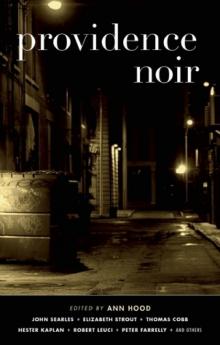 Providence Noir
Providence Noir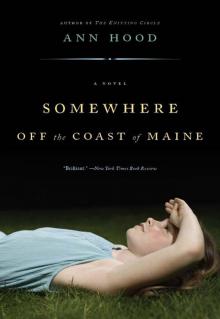 Somewhere Off the Coast of Maine
Somewhere Off the Coast of Maine Jewel of the East
Jewel of the East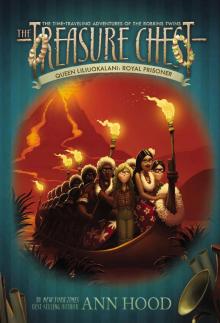 Queen Liliuokalani: Royal Prisoner
Queen Liliuokalani: Royal Prisoner The Knitting Circle
The Knitting Circle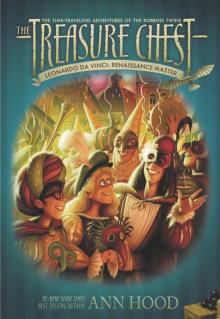 Leonardo da Vinci: Renaissance Master
Leonardo da Vinci: Renaissance Master An Ornithologist's Guide to Life
An Ornithologist's Guide to Life The Red Thread
The Red Thread She Loves You (Yeah, Yeah, Yeah)
She Loves You (Yeah, Yeah, Yeah)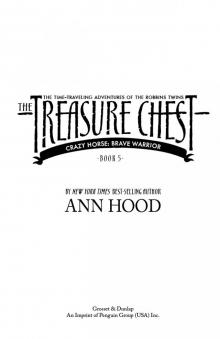 Brave Warrior
Brave Warrior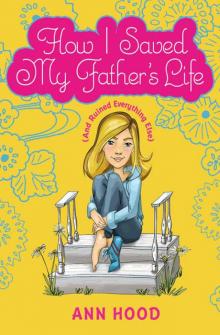 How I Saved My Father's Life (and Ruined Everything Else)
How I Saved My Father's Life (and Ruined Everything Else) An Italian Wife
An Italian Wife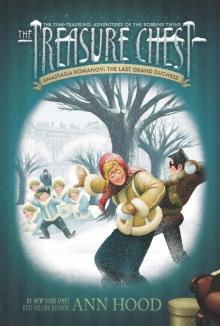 Anastasia Romanov: The Last Grand Duchess #10
Anastasia Romanov: The Last Grand Duchess #10 Prince of Air
Prince of Air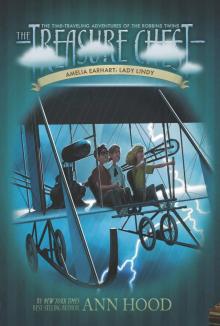 Amelia Earhart: Lady Lindy
Amelia Earhart: Lady Lindy Places to Stay the Night
Places to Stay the Night Little Lion
Little Lion Comfort
Comfort Angel of the Battlefield
Angel of the Battlefield